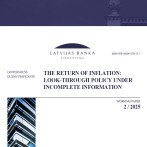Food price rises have abated, but fuel prices rising fast
In March, the consumer price level went up 0.7%. The annual inflation, mostly on account of base rate, rose only 0.2 percentage points reaching 4.2%. The 12-month average inflation is currently at 0.8%.
The rapidly rising global oil prices is the greatest contributor to the March price rise; it effected a fuel price leap in Latvia by 4.7%, which drove the overall inflation up by 0.3 percentage points. The food price rises have abated, however, because both shops and producers have already managed to make new supply agreements and for the time being prices are not subject to important changes. Within a month, food prices have gone up 0.4%; the annual rise is at 9.3%.
Under the influence of the base effect, the annual inflation is expected to stabilize, yet several factors in the near future will continue to drive prices up: global prices; electrical power tariffs already in effect and the tax rise scheduled for summer. Private consumption has an opposite effect: its recovery is weak and cautious, with prices rising under the influence of supply factors and unemployment remaining high.
In its overview of world food prices published yesterday, the UN Food and Agriculture Organization reports that for the first time in a year the global food index dropped in March. Month-on-month it dropped 2.9%, whereas the price level was still 36.5% higher than a year ago. The monthly drop was primarily accounted for by the drop in sugar prices for a second consecutive month. Grain prices also dropped -- by 2.6% -- in March.
The food price developments during the last month point to a possible stabilizing of prices, which, in all likelihood, is hardly an indication of a dropping trend in global food prices, for the high demand combined with the limited supply has acted to reduce the food reserve levels. In view of this, prices continued to rise and the pressure remains for a further rise in prices.
The world energy prices, on the other hand, have continued to rise fast over the last few months. They are prevented from stabilizing by the protracted conflict in Libya as well as by the resumed demand in Japan. Moreover, it is expected that as a number of Japanese nuclear power stations halt operations, the demand for energy resources will rise thus maintaining pressure on world energy prices.
Textual error
«… …»






